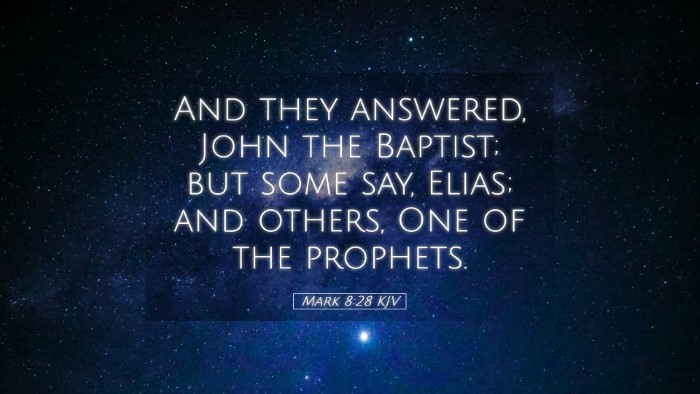Commentary on Mark 8:28
Mark 8:28 states, "And they answered, John the Baptist; but some say, Elias; and others, One of the prophets." This verse occurs in the context of Jesus' inquiry about public perception of His identity. This passage reveals not only the confusion surrounding Jesus' ministry but also points to deeper theological implications regarding prophecy and the fulfillment of the law.
Context and Background
Before delving into the specifics of verse 28, it is essential to understand the broader context in Mark 8:27-30. This passage occurs after significant miracles and teachings by Jesus, where He seeks to clarify to His disciples who He truly is. The question, "Whom do men say that I am?" serves as a gateway for understanding the varied perspectives on Jesus' identity among the people.
Public Perception: John the Baptist, Elias, and the Prophets
- John the Baptist: Many believed Jesus to be a resurrected John the Baptist. This is indicative of the powerful ministry John had prior to his execution. His fiery preaching and call to repentance resonated with many, and thus, the idea of Jesus being John resurrected represents a continuity of prophetic authority.
- Elias (Elijah): Elijah held a significant place in Jewish tradition as a forerunner to the coming Messiah. The expectation of Elijah's return was rooted in Malachi 4:5-6. By suggesting Jesus was Elijah, the people acknowledged His miraculous acts and prophetic voice, reflecting their hopes for divine intervention in their struggles.
- One of the Prophets: This response underscores the recognition of Jesus within the continuum of prophetic tradition in Israel. The prophets were revered as spokespeople of God, delivering messages of warning, hope, and restoration. By categorizing Jesus among them, the populace affirms His role as a messenger, albeit perhaps not fully grasping His divine nature.
Theological Implications
This verse serves as a profound theological reflection on identity, revelation, and expectation. The diverse answers reveal the human tendency to project our understandings onto the divine.
Revelation and Identity
As Matthew Henry highlights, the responses of the people illustrate a lack of understanding of Jesus' true nature and mission. Despite witnessing miracles, the crowds still viewed Him through the lens of historical figures rather than as the incarnate Son of God.
Expectations of the Messiah
Albert Barnes elaborates that the expectations surrounding the Messiah were deeply influenced by prophetic literature. While the people were aware of Jesus' remarkable works, their responses suggest they were looking for a political or military Messiah rather than one who would address the spiritual needs of humanity.
Discipleship and Understanding
Adam Clarke stresses the importance of personal revelation in the understanding of Christ's identity. The responses of the multitude serve to contrast the later acknowledgment by Peter (in the following verses) that Jesus is "the Christ." This shift from public speculation to personal revelation illustrates the journey every believer must undertake in recognizing Christ's true identity.
Application for Today's Believers
The exploration of Mark 8:28 invites contemporary believers to reflect on their perceptions of Jesus. Are their views shaped by popular opinions, or do they arise from personal encounters with Him? Moreover, understanding the multifaceted identity of Christ can reinforce one's faith and encourage deeper exploration of the Scriptures.
Encouraging Discernment
For pastors and theologians, this verse serves as a reminder to guide their congregations in discerning truth amidst a sea of competing narratives about Jesus today. Engaging with the text and teaching sound doctrine can help believers form a more holistic view of who Christ is.
Personal and Communal Reflection
Church communities may benefit from collectively discussing the question posed by Jesus: "Who do you say that I am?" Such exercises can promote unity in faith and lead to rich discussions about the implications of Christ's identity in the believer's life and mission.
Conclusion
Mark 8:28 serves as a critical text that encapsulates the challenge of understanding Christ's identity amidst varying perceptions. Drawing insights from historical commentators underlines the importance of contextual revelations and invites readers to consider how the responses of the crowd resonate in their own faith journeys. In recognizing Christ for who He is, believers are called to a deeper discipleship that transcends mere tradition and enters into a transformative relationship with the living God.


